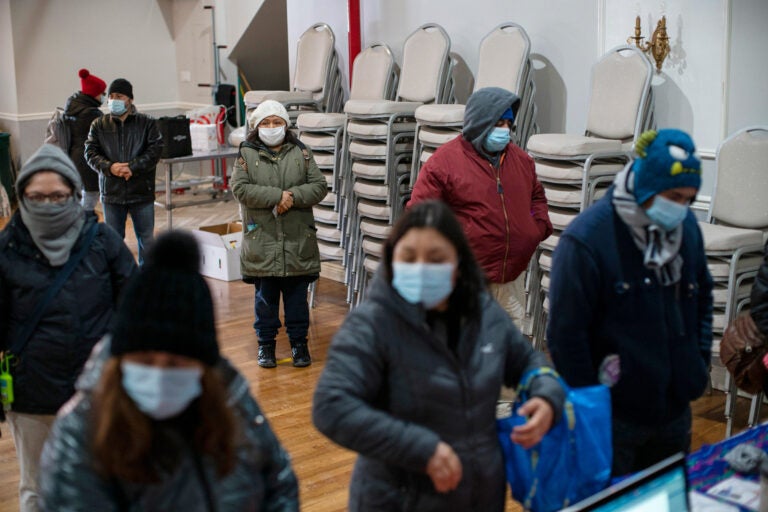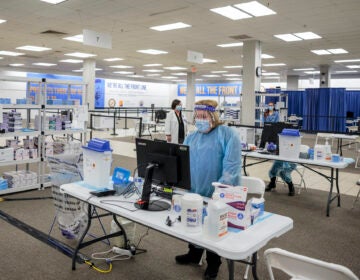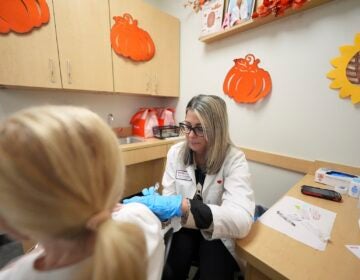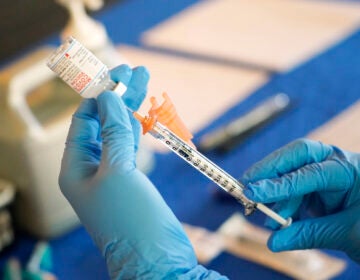Poll: Increasing number of N.J. Latinos say they would take COVID-19 vaccine
A study says N.J. Latinos are increasingly willing to get vaccinated against COVID-19, but one Latino advocate is concerned about lack of efforts to reach his community.

People wait to fill out forms at the community center Mixteca to receive food and get information about the COVID-19 vaccination during the coronavirus pandemic, Saturday, Feb. 13, 2021, in Brooklyn. (AP Photo/Eduardo Munoz Alvarez)
Increasingly, Latinos in New Jersey say they will likely take or have already received the COVID-19, according to a new poll.
Newark-based social justice nonprofit Project Ready says 77% of Latinos they polled in February are planning to or have already received the COVID-19 vaccine; up from 55% in November. Overall, 71% of those polled now say they would take the vaccine, compared to 60% in November. The rate of willingness to get vaccinated among African Americans remains largely unchanged.
There was a little bit of hesitancy in the beginning of the vaccine rollout in the Latino community, according to Christian Estevez, president of the Latino Action Network.
“People were not sure if the vaccine could be trusted given that the trial periods were short,” he said. “There was concern that we didn’t want to be the test subjects for the vaccine.”
Like Black Americans, Latino communities have also had studies conducted on them that are now viewed as unethical. Between 1946 and 1949, a U.S.-funded study deliberately infected hundreds of Guatemalans with syphilis and other sexually transmitted diseases. The U.S. government issued an apology for the study in 2010.
Estevez said Puerto Ricans in particular remember when birth control pill testing took place on the island, before the pill was widely available in the continental U.S. The Washington Post reported in 2017 that critics of the Puerto Rican trials have compared them to the Tuskegee Syphilis Study the government conducted on African American men in Alabama from 1932 to 1972.
As more people have been getting the vaccine, Estevez said that more are accepting that the vaccine is safe. He added that he has also seen more trust among immigrants that were older when they came to the U.S.
“Most of us get vaccinated when we’re small children and don’t really remember the experience,” he said. “But my mother and others, they all have that vaccine mark on their arm, so they have a memory of having been vaccinated at a time they can remember and knowing that they came out OK on the other end of it.”
The concern Estevez has when it comes to vaccine access is that it’s too focused on technology which “tends to be used by privileged communities” and is not reaching the Latino community.
“They’re not on Twitter waiting for the bot to tell them when there’s an appointment,” he said. “We’re not reaching the most vulnerable Latinos where they’re at.”
He says communities of color have not gotten their fair share of the vaccine that has been available. Estevez concurred with an idea brought up by Lt. Gov. Sheila Oliver recently that “non-traditional ways” should be embraced for reaching communities of color. Though, he said what’s nontraditional to some may be traditional to others.
“Our tradition IS that we get the word out through churches and some barbershops and through community-based organizations that serve our community,” he said. “In the Latino community, it’s the community-based social service agencies [and] nonprofits that have historically gotten the word out about programs and help people sign up for programs and getting access.”
At the same time, Estevez adds getting the word out is not enough. He suggested having centrally located clinics where people can get vaccinated or sign up for an appointment, especially if they lack internet access.
“You need to have people walk into a trusted place,” he said, “whether that be a church or a nonprofit community-based organization, where they see faces they know and trust that can help them fill out the forms in person, and then make sure somebody walks through that process until they have that shot in their arm.”

Get daily updates from WHYY News!
WHYY is your source for fact-based, in-depth journalism and information. As a nonprofit organization, we rely on financial support from readers like you. Please give today.




![CoronavirusPandemic_1024x512[1]](https://whyy.org/wp-content/uploads/2020/03/CoronavirusPandemic_1024x5121-300x150.jpg)



